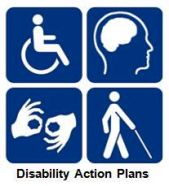 Good practice examples for Public Authorities
Good practice examples for Public Authorities
The Disability Discrimination Act 1995 (“DDA”) Section 49A requires designated public authorities to have due regard to the need, to promote positive attitudes towards disabled persons, and to encourage participation by disabled persons in public life. This duty is supported by an obligation to have a disability action plan, showing how a public authority proposes to fulfill the disability duties in relation to their functions.
The following examples highlight good practice work undertaken by public authorities, in respect of the disability duties, with a view to informing and encouraging other authorities to take similar action.